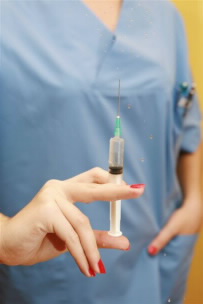FOR IMMEDIATE RELEASE
ACS News Service Weekly PressPac: May 05, 2010
Prescription drug could boost effects of vaccines for HIV and other diseases
A prescription drug already approved to treat genital warts and skin cancer may have a new use in boosting the effectiveness of future vaccines for bacterial and viral diseases, such as hepatitis C and HIV (the AIDS virus). These findings appear in ACS’ Molecular Pharmaceutics, a bi-monthly journal: “In Vitro Analysis of Acetalated Dextran Microparticles as a Potent Delivery Platform for Vaccine Adjuvants.”
John Pesce and colleagues at the Naval Medical Research Center and UC-Berkeley note that vaccines prepared from weakened or inactivated viruses or bacteria have had enormous success in preventing polio, influenza, and other diseases. However, vaccines containing living or weakened viruses cannot be used for HIV, hepatitis C, and other devastating diseases due to safety concerns. Scientists are instead trying to develop a new generation of vaccines, made with DNA or proteins from infectious agents that can prevent illness without carrying a risk of causing the diseases. These vaccines will be weaker than conventional vaccines and require a new generation of “adjuvants,” ingredients that boost a vaccine's immunogenicity.
The report identifies a promising candidate in the form of imiquimod, an immune-boosting drug already in general use. The scientists coated imiquimod with dextran-based microparticles in hopes of increasing the efficiency of cellular uptake by cells associated with immune response initiation. Sure enough, the coated drug significantly boosted levels of inflammatory cytokines in laboratory cultures of immune cells from mice. The findings have "broad significance" and open the door to more extensive testing of the approach, they indicate.
![]()
Contact
Science Inquiries: Michael Woods, Editor, 202-872-6293
General Inquiries: Michael Bernstein, 202-872-6042

virus) and other diseases may become
more effective with a drug now used by
doctors to treat genital warts and skin
cancer.
Credit: iStock
(High-resolution version)

